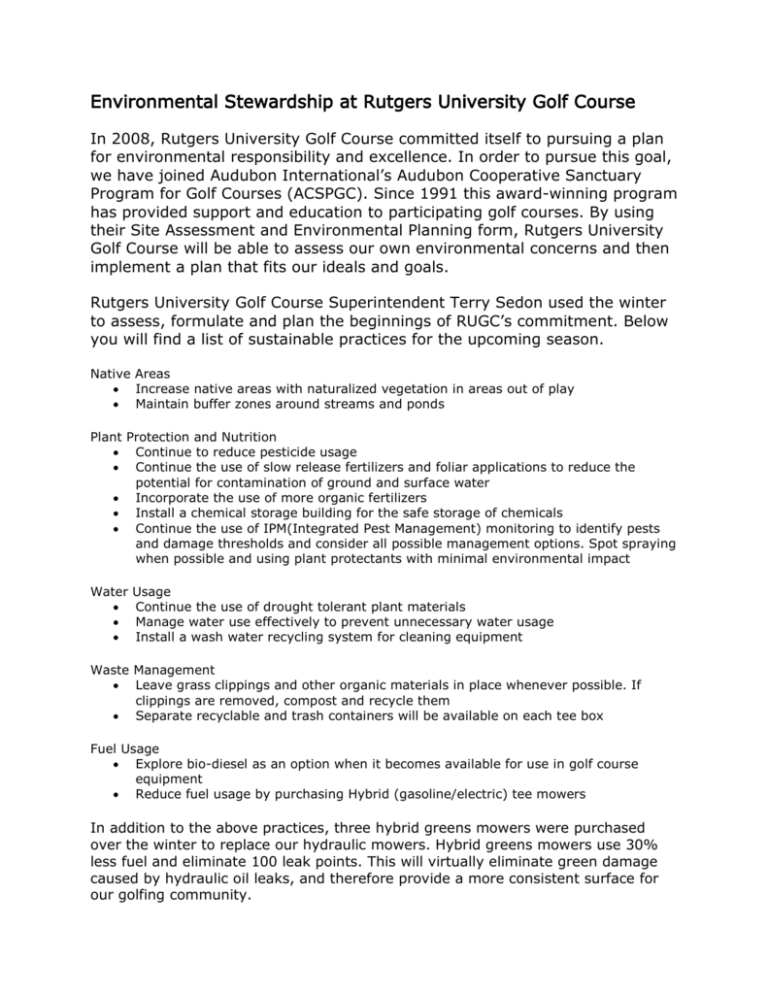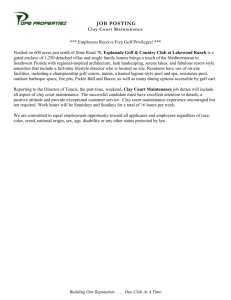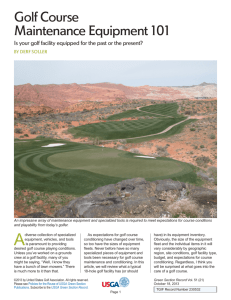Environmental Stewardship at Rutgers University Golf Course
advertisement

Environmental Stewardship at Rutgers University Golf Course In 2008, Rutgers University Golf Course committed itself to pursuing a plan for environmental responsibility and excellence. In order to pursue this goal, we have joined Audubon International’s Audubon Cooperative Sanctuary Program for Golf Courses (ACSPGC). Since 1991 this award-winning program has provided support and education to participating golf courses. By using their Site Assessment and Environmental Planning form, Rutgers University Golf Course will be able to assess our own environmental concerns and then implement a plan that fits our ideals and goals. Rutgers University Golf Course Superintendent Terry Sedon used the winter to assess, formulate and plan the beginnings of RUGC’s commitment. Below you will find a list of sustainable practices for the upcoming season. Native Areas Increase native areas with naturalized vegetation in areas out of play Maintain buffer zones around streams and ponds Plant Protection and Nutrition Continue to reduce pesticide usage Continue the use of slow release fertilizers and foliar applications to reduce the potential for contamination of ground and surface water Incorporate the use of more organic fertilizers Install a chemical storage building for the safe storage of chemicals Continue the use of IPM(Integrated Pest Management) monitoring to identify pests and damage thresholds and consider all possible management options. Spot spraying when possible and using plant protectants with minimal environmental impact Water Usage Continue the use of drought tolerant plant materials Manage water use effectively to prevent unnecessary water usage Install a wash water recycling system for cleaning equipment Waste Management Leave grass clippings and other organic materials in place whenever possible. If clippings are removed, compost and recycle them Separate recyclable and trash containers will be available on each tee box Fuel Usage Explore bio-diesel as an option when it becomes available for use in golf course equipment Reduce fuel usage by purchasing Hybrid (gasoline/electric) tee mowers In addition to the above practices, three hybrid greens mowers were purchased over the winter to replace our hydraulic mowers. Hybrid greens mowers use 30% less fuel and eliminate 100 leak points. This will virtually eliminate green damage caused by hydraulic oil leaks, and therefore provide a more consistent surface for our golfing community. WHAT RU GOLFERS CAN DO: 1. Utilize recyclable containers for all recyclable items 2. Do not enter designated environmentally sensitive areas on the course 3. Pick-up trash where ever visible 4. Encourage & support fellow golfer’s participation in enhancing the natural environment of the golf course We at Rutgers University Golf Course believe strongly in this environmental commitment to the golf course and the surrounding community. We also look forward to becoming a leader in environmental stewardship in the years to come, and hope that you will join us in this effort. We can’t do this alone! To find out more information regarding Environmental Stewardship and what you can do to help, please visit the United States Golf Association at USGA.org or Audubon International at AudubonInternational.org.







